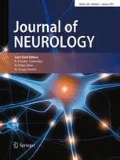Abstract
Background Modafinil is a unique wake-promoting agent that is chemically distinct from traditional stimulants. Results of a placebo-controlled study showed it to improve fatigue in multiple sclerosis (MS) at a dose of 200 mg daily, but not at a dose of 400 mg daily. Objective To establish the efficacy, safety and appropriate dose of modafinil in the treatment of fatigue and sleepiness in patients with multiple sclerosis. Method A total of 50 patients diagnosed with MS (mean age 40.4 ± 10.3 years, 30 females/20 males; MS type: 36 relapsing remitting, 1 primary progressive, 13 secondary progressive; mean disability level 3.8 ± 1.5 on the Kurtzke EDSS) and complaining of chronic fatigue were enrolled in a prospective 3-month, two-center, open-label study. Efficacy was evaluated with the Fatigue Severity Scale (FSS, score range 0-42), the Epworth Sleepiness Scale (ESS, score range 0-24) and by subjective patient appraisal of change of fatigue, quality of life and overall satisfaction with treatment. Adverse effects (AEs) were recorded throughout the study. Treatment was started with a single daily dose of 100 mg in all patients. In non-responders the dose was increased by 100 mg increments up to a maximum daily dose of 400 mg. Results Three patients discontinued modafinil because of AEs (nervousness, dizziness). Two patients (4 %) were treated with 50 mg, 25 (50 %) with 100 mg, 21 (42 %) with 200 mg and 2 (4 %) with 300 mg daily. No patient required 400 mg daily. Mean FSS scores were 30.3 ± 8.5 at baseline and 25.4 ± 3.7 at 3 months (p < 0.0001). Mean ESS scores were 9.7 ± 3.9 at baseline and 4.9 ± 2.9 at 3 months (p < 0.0001). Self-appraisal of change of fatigue showed clear improvement in 41 patients (87.2 %), some improvement in 4 (8.5 %) and no change in 2 (4.3 %). Overall clinical condition was clearly improved in 43 patients (91.5 %), somewhat improved in 1 patient (2.1 %), and unchanged in 3 patients (6.4 %). No patient reported worsening of overall clinical condition. Conclusions Treatment with modafinil significantly improves fatigue and sleepiness and is well tolerated by patients with MS. Unlike the higher dose regimen required in narcolepsy, a low-dose regimen of modafinil is effective in MS.
Similar content being viewed by others
Author information
Authors and Affiliations
Additional information
Received: 10 August 2001 Received in revised form: 22 January 2002 Accepted: 25 January 2002
Rights and permissions
About this article
Cite this article
Zifko, U., Rupp, M., Schwarz, S. et al. Modafinil in treatment of fatigue in multiple sclerosis . J Neurol 249, 983–987 (2002). https://doi.org/10.1007/s00415-002-0765-6
Published:
Issue Date:
DOI: https://doi.org/10.1007/s00415-002-0765-6



